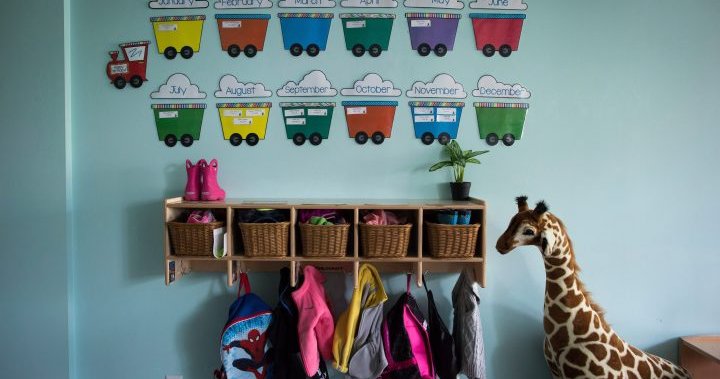Child-care fees have been cut in half in 18 big Canadian cities across all age groups, but some are still falling short on meeting the federal government’s target, according to a new report.
Five jurisdictions — Quebec, Manitoba, Saskatchewan, Newfoundland and Labrador, and Nunavut — have already reached Ottawa’s long-term goal of $10-a-day-child care, three years in advance, the Canadian Centre for Policy Alternatives, which conducts 11,000 telephone calls as part of its data collection, said in its annual report Thursday.
But some experts say there’s still more work to be done to make child care more accessible and inclusive.
The federal government signed separate, five-year funding agreements with provinces and territories in 2021, committing up to $30 billion toward the establishment of $10-a-day child care by 2025-26.
As part of that agreement, provincial and territorial government governments also promised to reduce daycare fees by 50 per cent by the end of 2022.
Provincial and territorial capitals as well big cities in Ontario, Saskatchewan, Manitoba, Newfoundland and Labrador, the Northwest Territories, Yukon and Nunavut, have successfully met that target or exceeded it.
“This is quite a win given the ambitious timeframe of this goal, 50 per cent reduction in fees,” said David Macdonald, senior economist with the Canadian Centre for Policy Alternatives.
“It was to happen within about a year and a half of the initial legislation being laid down. That’s very quick when it comes to a big national program like this,” he told Global News in an interview.

Big cities in Alberta, British Columbia, Nova Scotia, Prince Edward Island and New Brunswick have not been able to slash their child-care fees in half, the report showed.
Macdonald said both P.E.I and Alberta have low-income subsidies in place that they’re counting toward a 50 per cent reduction, which partly explains why they’re falling short of hitting the federal goal.
In British Columbia, the picture is “more mixed,” he said, with Kelowna and Vancouver close to hitting the 50 per cent target, while others are further away.
“In part, the reason for that is in Vancouver, for instance, the province has been pushing $10-a-day spaces where they are expanding their small $ 10-a-day program that brought fees down in Vancouver, but the same sort of thing isn’t happening in other places like Surrey or Burnaby.”
Quebec, which reached an asymmetric agreement with Ottawa in 2021 to receive $6 billion over five years to support care in the province, had child-care fees below $10 per day in 2019. It was the only province to see daycare fees go up this year for all groups compared with 2019.
Despite that, Quebec cities have the lowest monthly child-care fees in the country right now, at $192 for infants and toddlers.

Richmond, B.C., and Toronto have the most expensive infant care for the under 18-month age group, costing a median of over $900 per month, the report said.
Richmond also has the highest child-care fees for toddlers aged one and a half to three years, with a median of $905 per month, followed by Calgary with $808 a month and Toronto with $725 a month.
For preschoolers, aged 2.5 to five years, Calgary is the most expensive city at $810 a month, followed by $800 a month in Richmond and $600 a month in Oakville, Ont., Vaughan, Ont., Toronto, Burnaby and Surrey, the CCPA report showed.
How did provinces cut fees?
Provinces and territories have taken different approaches to getting their fees down.
More than half of the jurisdictions — Newfoundland and Labrador, P.E.I., New Brunswick, Quebec, Manitoba, Saskatchewan and Nunavut — now have set fees, which means that all parents pay the same amount, oftentimes the same fees for all age groups.
The rest, in Nova Scotia, Ontario, Alberta, British Columbia, Yukon and Northwest Territories, are using market fees, reducing them either by a flat dollar amount or a percentage.
“I think what’s important going forward is we continue to move towards the set fee model that half of the provinces and territories are at, where all parents pay the same amount across all age groups and then ratchet those fees down to the long-term goal, three years from now of $10 a day,” Macdonald said.

As Canadian families continue to grapple with a high cost of living, the lower daycare fees have offered some relief to parents across the country.
But there is still work to be done to make child care more accessible and inclusive, said Marni Flaherty, interim CEO of the Canadian Childcare Federation.
“The investment federally is awesome and the concept of $10 a day is awesome, but we do have to start to focus more so on building a system,” she said in an interview with Global News.
“We have to start to focus on the workforce and then as part of expansion, improve quality for children and families,.”
With the fees reducing, the wait-lists for daycare spots are also getting bigger, she said.
In addition to adding more daycare facilities, hiring and retaining staff is another challenge, Macdonald said.
“One of the big challenges in terms of building out spaces isn’t only properly planning where those spaces will be built, but who will staff them and how do we keep those folks in the sector longer term,” he said.
— with files from The Canadian Press




